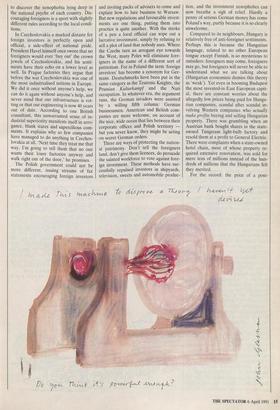WHO NEEDS FOREIGNERS?
Anne Applebaum explains
Eastern European attitudes to Western investment
NO END of German-, English- and French-speaking businessmen can be found lurking within the over-decorated hotel lobbies of Eastern Europe these days, willingly eating the strange and greasy food, happily enduring the lack of telephone connections and fax machines. 'Business class' on Lot, Maley, and Czechoslovak airline flights from London are nearly always full, although the seats in the Soviet-made planes are narrow and the drinks cost extra. Nearly every major Western consulting firm, investment bank, or accountancy now has its very own Eastern European research division, staf- fed by 'regional specialists', usually American-born executives with Polish or Hungarian surnames who were fortuitously discovered in the Chicago office. Many of these professional advisers have newslet- ters, and special advertising campaigns, and good connections with the finance minister. A few of them have some business as well, but when pressed they admit that it is financed by the World Bank.
Much has been written lately about the plight of the Eastern European worker, now forced to live under the unaccustomed strictures of monetary reform. Little sym- pathy is given to these foreigners who are desperately trying to make money off the fruits of his alienated labour. While the living standards of the average Pole, Hungarian, Czech or Slovak are bound to rise eventually, those of the Western inves- tors forced to breathe the polluted air of Warsaw, Budapest or Prague are dropping rapidly, The stress of constant failure, of unending battles with bureaucracy, of con- stantly changing regulations, is surely tak- ing a toll on their health.
There has been much talk so far, as they say, and little action. Out of 3,000 joint ventures registered in Poland, only about one third are actually operable, and only a tiny portion of the one third is worth more than the $50,000 minimum required invest- ment. In Czechoslovakia, the number is more like 600 and the money involved even less. With about 5,000 registered joint ventures things are better in Hungary, although major deals, as opposed to repre- sentative offices, have been slow in coming there too. Barely a week goes by without somebody hanging a new company logo out on Vaci Utca, Budapest's Oxford Street, but behind the shiny new doors there are a lot of men in suits complaining about high taxes, complicated customs regulations and low worker productivity.
If business is being discouraged, how- ever, the foreigners aren't the ones doing the discouraging. Given the now familiar image of Polish, Czechoslovak and Hun- garian politicians lining up to pledge their good will and to plead for credits, debt relief and attention at meetings of the International Monetary Fund, it is a shock 'It's a great buy, General, and it carries the Good Housekeeping Seal of Approval.' to discover the xenophobia lying deep in the national psyche of each country. Dis- couraging foreigners is a sport with slightly different rules according to the local condi- tions.
In Czechoslovakia a marked distaste for foreign investors is perfectly open and official, a side-effect of national pride. President Havel himself once swore that no foreigners would ever 'buy out' the crown jewels of Czechoslovakia, and his senti- ments have their echo on a lower level as well. In Prague factories they argue that before the war Czechoslovakia was one of the most industrialised nations in Europe. We did it once without anyone's help, we can do it again without anyone's help, and never mind that our infrastructure is rot- ting or that our engineering is now 40 years out of date. According to one British consultant, this unwarranted sense of in- dustrial superiority manifests itself in arro- gance, blank stares and supercilious com- ments. It explains why so few companies have managed to do anything in Czechos- lovakia at all. 'Next time they treat me that way, I'm going to tell them that no one wants their lousy factories anyway and walk right out of the door,' he promises. The Polish government could not be more different, issuing streams of fax statements encouraging foreign investors and inviting packs of advisers to come and explain how to lure business to Warsaw. But new regulations and favourable invest- ments are one thing, putting them into practice is quite another. With the stroke of a pen a local official can wipe out a lucrative investment, simply by refusing to sell a plot of land that nobody uses. Where the Czechs turn an arrogant eye towards the West, many Poles will eliminate fore- igners in the name of a different sort of patriotism. For in Poland the term 'foreign investors' has become a synonym for Ger- mans. Deutschmarks have been put in the same category as the Teutonic Knights, the Prussian Kulturkampf and the Nazi occupation. In whatever era, the argument runs, the German invaders were assisted by a willing fifth column: German businessmen. American and British com- panies are more welcome, on account of the nice, wide ocean that lies between their corporate offices and Polish territory but you never know, they might be acting on secret German orders.
There are ways of protecting the nation- al patrimony. Don't sell the foreigners land, don't give them licences, do persuade the sainted workforce to vote against fore- ign investment. These methods have suc- cessfully repulsed investors in shipyards, television, sweets and automobile produc- tion, and the investment xenophobes can now breathe a sigh of relief. Hardly a penny of serious German money has come Poland's way, partly because it is so clearly unwelcome.
Compared to its neighbours, Hungary is relatively free of anti-foreigner sentiments. Perhaps this is because the Hungarian language, related to no other European tongue except Finnish, is so mysterious to outsiders: foreigners may come, foreigners may go, but foreigners will never be able to understand what we are talking about (Hungarian economists dismiss this theory as 'weak'). Yet even in booming Budapest the most invested-in East European capit- al, there are constant worries about the allegedly low prices being paid for Hunga- rian companies, scandal after scandal in- volving Western companies who actually make profits buying and selling Hungarian property. There was grumbling when an Austrian bank bought shares in the state- owned Tungsram light-bulb factory and resold them at a profit to General Electric. There were complaints when a state-owned hotel chain, most of whose property re- quired extensive renovation, was sold for mere tens of millions instead of the hun- dreds of millions that the Hungarians felt they merited.
For the record: the price of a post- communist company is impossible to calcu- late properly. What a factory might be worth in Belgium bears no relation to what it is worth in Lomza, where the telephones connect to something but not necessarily to one another, the workers are accustomed to taking early retirement and the access roads are full of potholes. Whatever profit the Lomza factory made last year has nothing to do with what profit it m ight make next year, given that tax and customs regulations, credit availability and inflation rates change from day to day. If Hungarian or Polish or Czechoslovak companies we- ren't relatively cheap, no one, given the complexity of their problems, would bother to invest in them at all.
Everywhere, fundamental misunder- standings about the nature of modern commerce are the main stumbling-block. Taught for decades that wealth, Soviet- style, means coal mines and minerals, iron, steel and heavy industry, the Eastern Europeans are now emerging into a world where wealth requires resource manage- ment rather than resources, and where some of the wealthiest countries have no natural assets at all. It isn't how much you have buried underground that counts, but how you organise things on the surface. Accordingly, foreign investors are not trying to steal locally mined diamonds and sell them elsewhere for profit, but to sell diamond mining and processing equipment to the natives.
These days, a foreign investor wants to buy a percentage of a company's stock, to improve quality, to re-organise, to help a company get access to Western markets, and then finally to take a part — but not all — of the profits. Eastern European com- panies badly need such investment, as access to Western distribution outlets alone could make the difference between bankruptcy and survival. But try explain- ing that to the new politicians who spot a seed of corruption at the heart of every joint venture contract.
But the Westerner who is willing to make concessions to the local conditions is very rare. A businessman of my acquaint- ance recently arrived in Warsaw for lunch, announcing that he had been in Zurich yesterday and would be in Dusseldorf tomorrow. He pronounced Poland the country of the future over caviar and blinis, complained that things were moving mys- teriously slowly on his particular deal over schnitzel, and professed total ignorance of Polish company structure as he reached dessert, by which time he was forced to leave for the airport, skipping coffee. Like many other denizens of Eastern Europe's international hotels and fine restaurants, he may well be destined to emerge from his Polish adventures empty-handed, a victim of the assumption that business works more or less the same way everywhere.
These are countries where the rules are unpublished, or they are unknown, or they are about to change, tomorrow or the day after, when and if the parliament meets as it is supposed to. These are countries where complex systems of book-keeping exist far apart from any concept of 'profit'. These are countries where even corruption is a hit or miss proposition: this bureaucrat might be susceptible to bribery, while that one working in the office next door might find it an affront to his patriotism and the memory of his grandfather, a cavalry offic- er in Emperor Franz Josef's army. There is no standard for commercial behaviour because there wasn't any commerce until very recently, so anyone expecting 'busi- ness as usual' will end up throwing money into a great, black, post-Communist hole.
For the very determined, there are undoubtedly profits to be made. Labour is still cheap and the hunger for consumer goods goes unquenched. Clever marketing has already proven itself capable of creat- ing appetites for things hitherto un- dreamed of: ladies razors, cat food, video games. Sooner or later, Western com- panies will follow their rivals, learning from others' mistakes, slowly hiring people who speak the language and know the system. Sooner or later, post-communist companies will see that their potential Western partners are not going to take their factories apart and ship them back home to Irkutsk, piece by piece, just as the Red Army did with whatever it found still standing in 1945.




















































 Previous page
Previous page